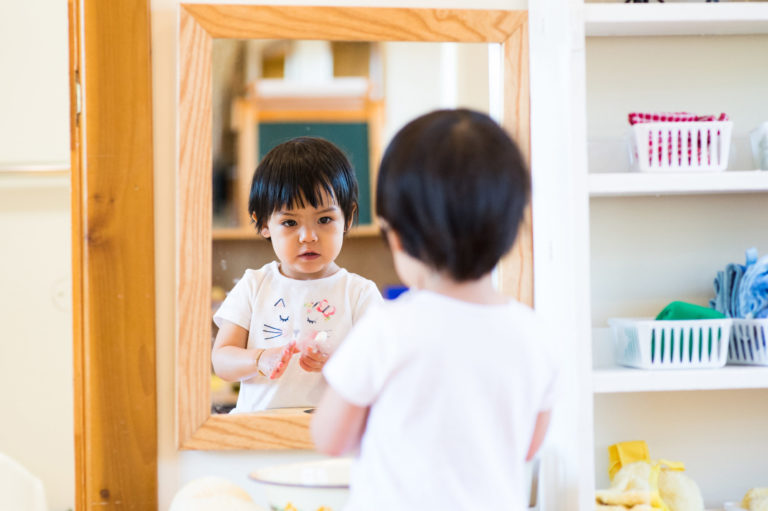Toddlers love water and water play. One of the first lessons they receive at VFKH is “Handwashing as an Exercise.” Because toddlers are natural imitators, the mundane, adult tasks, such as handwashing, pique their curiosity. They want to imitate adults and master the same tasks they see them doing. And if water is involved, the task is double the fun!
In our toddler classroom, we have a dedicated handwashing station with a painted metal basin and mirror. The basin is set on a table at the children’s height so it is easy for them to access. Our handwashing activity starts with the teacher reviewing the proper handwashing procedure and demonstrating each step. Then the child puts on their soft terry cloth apron and gets started!
The Montessori Handwashing Exercise
For this exercise, the child does all the tasks on their own, starting with taking the metal pitcher to the child-sized sink and filling it with the warm water. The child returns to the handwashing station, walking slowly to prevent spilling, and carefully pours the water into the basin. Then the child places his or her hands in the basin to start washing them. They touch the water and notice their hands are wet and there are drips of water on their fingers.
Now the child has the opportunity to work through the steps of handwashing with a bar of soap to wash each finger, hand and wrist. Toddlers delight in the bubbles they create and how clean they have made their hands. The last step of the activity is the child cleaning up the area so the station is ready with fresh linens for the next child. During the exercise, water is expected to spill, and if it spills on the floor, it naturally leads into a mopping presentation.
A Practical Life Lesson
The first three years of life are the most important for intellectual development. This is why at VFKH we have created toddler activities such as the handwashing station that are not only fun and interesting, but naturally establish fundamental learning skills needed for future learning. For example, the children follow over 70 sequential steps in the handwashing exercise described above. With repetition, the child revels in their mastery of carrying a full bucket of bubbly water to carefully empty into the sink. The child is not thinking of all 70 steps in the process of this exercise, but they are engaged in the process as they perform each step and work on skills including independence, coordination, concentration, and self-care.
These practical life lessons provide hands-on learning experiences and opportunities for children to imitate the world. They internalize the order of their world in activities that integrate their will, intellect and movement.
